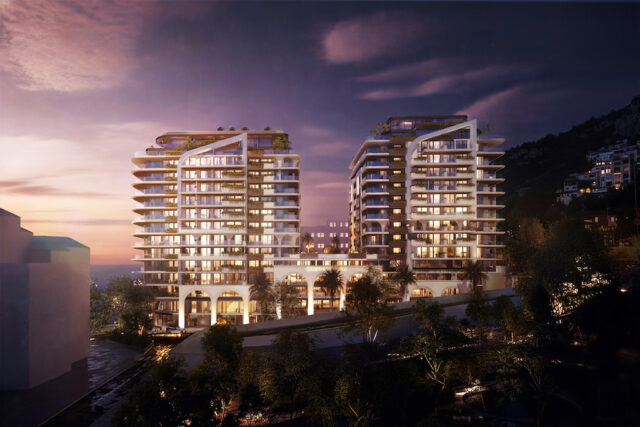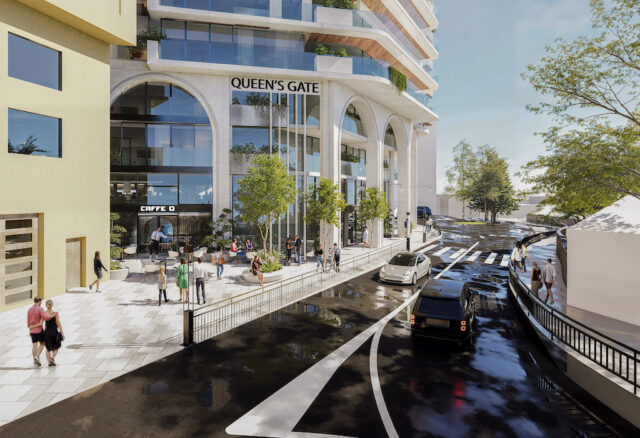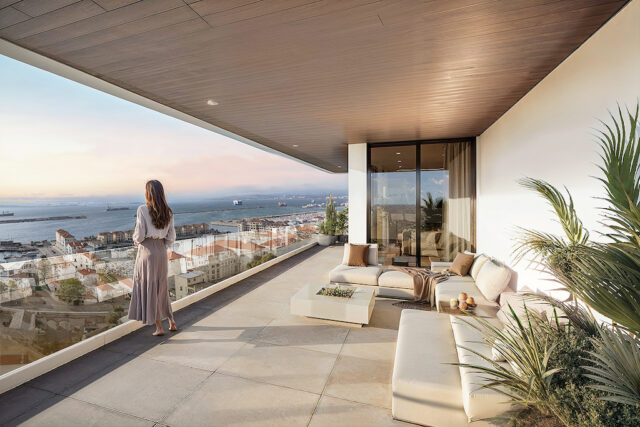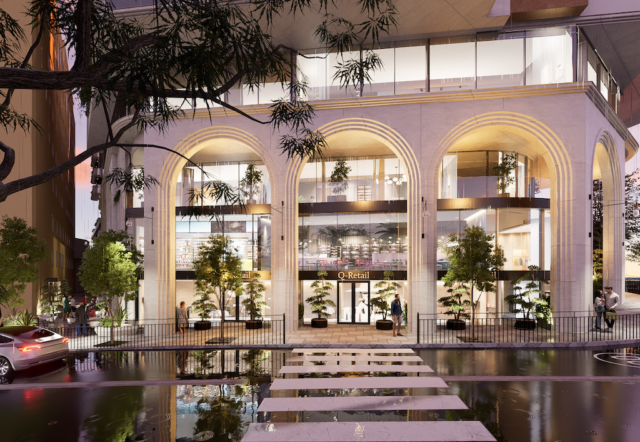DPC greenlights Queen’s Gate Waters development
Photos courtesy of QCD Limited.
The Development and Planning Commission approved the full planning application for Queen’s Gate Waters, a mixed-use development at Boyd Street, including 224 apartments, 14 senior living units, and retail spaces.
The commission approved the application with conditions, emphasising the need for detailed traffic management plans and compliance with environmental standards. The project is expected to take around three and a half years to complete.
The approval, with six in favour and four against, for the redevelopment of the Queen’s Hotel and former Queen’s Cinema site at Boyd Street followed a lengthy debate on the application which also included objections.
“We're thrilled to announce that Queen's Gate Waters, an exceptional residential development set to redefine the Gibraltar skyline, has been granted full planning permission,” a spokesperson for the developer, QCD Limited, told the Chronicle.
“The prestigious development will positively transform the entrance to the city from the south, creating a new vibrant and inviting community hub.”
“This new Gateway to the City will, in many ways, become the Casemates of the South. With construction set to commence in early 2026, the first phase release, to be known as 'Elizabeth Waters One', is imminent.”




Deputy Town Planner Chris Key outlined the proposal: “It comprises the Queen’s hotel and the former Queens Cinema, which is now used as a car park… The principle of the mixed-use development that has been put forward today for full planning, there were conditions on it requiring further refinement to the west tower, including the massing of it, as well as the refinement of the podium to better relate to Trafalgar House and the inclusion of street-level water features.”
The proposed development includes 224 apartments, which includes 14 senior living units supported by an underground car park with 175 car parking spaces.
There are a number of retail and hospitality units placed at ground level to create an active streetscape, as well as a cultural dance hall facility to be run in partnership with the Ministry of Culture.
Objections were raised by some residents, including one who said: “We are told that architects and town planners consulted the community. Maybe a few people were asked, but not one resident I know from the Upper Rock was ever consulted.”
“The reality is that those most affected have been ignored, many are deeply disappointed, especially when they see the proposed towers that will rise above Trafalgar house completely out of place and out of scale with the surroundings.”
She continued: “These oversized blocks aren't just an eyesore. They pose real risk to the very foundations of Trafalgar House causing genuine anxiety and distress amongst its residents.”
“The development threatens to make an already terrible traffic situation even worse… Once again, we see so-called affordable housing that is anything but affordable. We see developments designed not for ordinary Gibraltarians but for wealthy foreign investors.”
Another resident called for clarity on construction measures and the noise from piling. He also questioned the availability of technical reports and mitigation measures for traffic and construction impacts.
Another objector added: “First of all, we live in a neighbourhood that consists mainly of six to eight storey mid century buildings with traditional outlook, a 12-storey, modern structure just does not fit in there… I am very worried about our foundations, and I hope that a full survey will be done before any work is carried out. Should permission be granted, we need to know how sound and stable our foundations are.”
Paul Passano of Gamma Architects, responded for the applicants.
He said: “I think the aspiration of this project, from day one, has always been to regenerate what is currently, a long-neglected site that is a bit of an unsightly choke point at the moment for the hundreds of thousands of both tourists and locals who would traverse the sites each year… The aspiration was that this would be a gateway, and something that the community could be proud of as an active part of that active hub.”
On construction concerns, he said: “We have done substantive tests already with geotechnical boreholes, which have enabled us to actually take the design further than what is normally required at full planning, to be able to confirm the sort of foundation approach that will be most likely, and that is confirmed to be board piles, which are not driven piles, as a lot of locals would be concerned about… the bored pile would be a much more silent and almost vibration-free method of creating the foundations and the excavations.”
Commission members raised further questions about the scale of the project, with Janet Howitt from the ESG stating that she felt very much that the development was too big for that area, and it could definitely lose several floors to make it blend in better, rather than stand out as it does
Mr Passano told her that: “It's been absolutely pushed to the nth degree to keep the massing as it was, without any further impact… the design is flexible units for that use at the moment, and that's what we would have planning permission for. If those were to have a change of use in future, that would require another planning application.”
After a discussion, the commission voted to approve the application subject to all the conditions that have been referenced at report.
Other applications
The DPC discussed and turned down a request from TNG Global for a temporary relaxation of noise hours for Phase One of Bayside Central's underground parking.
The applicant sought to work on four consecutive Sundays from October 19 to November 9, 2025, due to delays and the urgent need to complete drainage infrastructure before the onset of the rainy season.
During the meeting, officials highlighted that the site is surrounded by residential and commercial properties, including Ocean Spa Plaza and the World Trade Center, and has already been the subject of complaints regarding excessive noise and dust.
Representatives for the applicant explained that the request was intended as a contingency measure in case of adverse weather, and that Sunday works would only be activated if necessary.
“The ability to activate Sunday working time was just purely to provide flexibility, to maintain momentum, to mitigate any sort of issues whilst we’re installing the culverts and the connection to the main network,” a spokesperson said, adding that all efforts would be made to minimise disruption.
However, DPC members maintained that the responsibility for delays lay with the applicant and that the works should be completed within the already stipulated hours.
All members voted against permission.
Members unanimously voted to refuse a planning application for a proposed motorcycle parking shed on Castle Road, citing concerns over traffic, public amenity, and the precedent such a structure would set.
Approval was given for a terrace extension at 3 Catalan Gardens, subject to the outcome of an ecological assessment. Should that assessment raise concerns, the application will be brought back to the Commission for further consideration. A vote saw seven members in favour and three against.
A proposal to construct a glazed bridge linking two buildings on Tuckey’s Lane and Irish Town was unanimously refused by the DPC, following concerns over its impact on the historic character of Gibraltar’s Old Town.
Also being refused was the application to install a security gate at the Marina Club.
The proposal, brought forward by the Marina Club management, sought to restrict pedestrian access to the area between 10pm and 6am, citing ongoing issues with vandalism and unauthorised activity during night-time hours.
The applicant argued that the measure, supported by the Royal Gibraltar Police and HM Customs, would balance public enjoyment of the waterfront with the need for security.
However, objectors insisted that the plan represented a “fundamental change in the spirit of the proposal” and a breach of the original planning conditions, which guaranteed “full unhindered access throughout the development as a whole, with access to the most westerly point, with the pier at the mirador.”
The DPC agreed and the application was unanimously refused.
A green roof project for Gibraltar’s Midtown bus stop received unanimous approval.
The proposal, submitted by the Gibraltar Horticultural Society, will see an eight-square-metre modular vegetated roof installed atop the existing bus shelter. The initiative is designed to enhance urban greening, reduce the urban heat island effect, and contribute to Gibraltar’s 25-year environmental plan.
With four more green roof projects in the pipeline, the Commission also agreed that future applications for similar green roofs could be handled by a subcommittee to expedite the process.
A proposal to refurbish and extend the Ocean Restaurant at West Place of Arms was met with resistance from heritage bodies and the Town Planning Department citing concerns over further encroachment on the city’s iconic fortifications. The application sought to replace a dilapidated structure and expand the glazed enclosure further into the terrace.
The DPC ultimately agreed to issue a modification order, allowing only the replacement of the existing structure within its current footprint.
A minor amendment for a boutique hotel development at the old Toc H site, involving a lift shaft and cantilevered terrace near the Charles V Wall, was considered. The lift shaft, constructed without prior consent, was criticised for its visual impact on the heritage site.
After a vote, the commission approved the revised plans by majority with six in favour, one against and two abstaining. Approval is subject to further work on the design and finish of the lift core, with the aim of minimising its visual impact.
The last item on the agenda was for 22-24 Town Range and resulted in the developer being ordered to reinstate the building’s historic façade which was removed without permission to facilitate construction access.
The Town Planning Department, supported by heritage bodies, insisted that the façade be reinstated immediately before any further permits are issued.
While the DPC approved the minor amendments to the scheme, it made clear that legal action would be considered if the reinstatement of the façade was not carried out promptly.
The next DPC meeting is scheduled for November 13.









